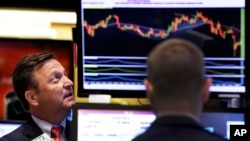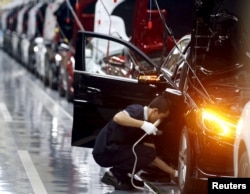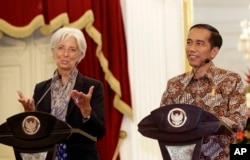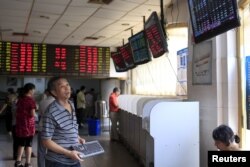Worries about China's economic growth were sharpened by a disappointing report on that nation's huge manufacturing sector Tuesday, sparking another global stock sell-off.
In London and New York, shares lost 3 percent, while Paris and Germany dropped around 2.4 percent. Prices on the Shanghai market fell drastically at Tuesday's open, but regained some strength to close at a loss of just over 1 percent, as Chinese officials insisted the situation was under control.
China's official manufacturing index for August fell slightly to its lowest level since 2012. A survey by Markit, which focuses on smaller private firms, showed factory activity at the weakest performance level in 6½ years.
China is evolving from an export-driven manufacturing economy toward one based more on services and domestic demand. The world's second-largest economy also is struggling with market-oriented reforms intended to make it more efficient and productive. China has been an engine of economic growth for many years, so changes, and setbacks there, ripple through the global economy, affecting stock and commodity prices in particular.
Bumpy ride
The developments have been so significant that Japan’s finance minister, Taro Aso, suggested Tuesday that the Chinese economy be a focus of this week’s meeting of the Group of 20 major economies.
Aso said that instead of being swayed by superficial market moves, he believes it is important to understand the structural issues affecting markets in China.
“I think it’s beneficial to hold a frank debate at G20 on what is happening in the Chinese economy,” Aso said.
During a visit to Indonesia Tuesday, International Monetary Fund Director Christine Lagarde urged emerging economies to be vigilant for spillovers from China’s slowdown.
Lagarde said China’s slowdown was not sharp or unexpected. But it's clear, she said, that the country is adjusting to a new growth model.
"The transition to a more market-based economy and the unwinding of risks built up in recent years is complex and could well be somewhat bumpy," she said.
An official at China’s National Development and Reform Commission, the country’s top economic planning agency, said Tuesday that stock market volatility had been contained, and that the country could push forward with market reforms.
Sentiment sinking
China has unleashed a flood of measures to defend market prices, but the index continues to fall. The main index in Shanghai is down about 40 percent since mid-June.
For many who watch the market, it is hard to tell just how low the index could go.
"For now, no one can say for sure if the markets have hit rock bottom," said Lu Suiqi, an associate professor of economics at Peking University.
New measures announced by the government Tuesday, including policies to support mergers and acquisitions, cash dividends and share buy-backs by listed state-owned companies, did little to boost sentiment.
Critics contend such reforms are a dead end when it comes to the long-term health of the Chinese economy.
"If [policymakers in] China continue the mindset of making state-owned enterprises bigger and stronger, such state-owned enterprises will still be short of efficiency and fair play,” said Hu Xingdou, an economics professor at Beijing University of Technology.
What is more important is to attract more private investment and encourage the privatization of state-owned enterprises, he said.
Hu said efforts to prop up the market before this week’s massive military parade in Beijing could only fuel unrealistic expectations among investors for a government bailout. Such tactics also violate free-market mechanisms, he said.
"Between the government [intervention] and the market [reform], China on the one hand allows market [forces] to prevail, but on the other hand, it has overdone it when it comes to intervention," Hu said.
Liao Qun, chief economist at China CITIC Bank, said that while China's manufacturing industry was performing poorly, services were continuing to do better than anticipated. He said he thought it would take some time for the overall economy to rebound.
“In the short term, the government still needs to expand its pace of monetary easing and the use of fiscal stimulus to help stabilize demand,” Liao said.
Growth forecasts cut
The turmoil in China’s stock market and devaluation of its currency led economists at Goldman Sachs to slash their forecasts for China for the next three years, saying that by 2018 China’s economic growth was expected to slow to 5.8 percent.
Goldman Sachs expects growth of 6.4 percent and 6.1 percent for China in 2016 and 2017.
According to the Reuters news agency, economists at ANZ also were rethinking their forecasts. Based on the manufacturing data released Tuesday, economists said they expected China’s economy to grow by 6.4 percent in the third quarter but to rebound with policy support to 6.8 percent in the fourth quarter.
Some said it wasn't fair to blame market volatility entirely on China. Joseph Minarik, research director for the Committee for Economic Development, a business-oriented public policy group in Washington, said persistent problems in Europe have been largely ignored, even as the U.S. economy settles into a very slow recovery.
“Probably the headline discussion right now is about China. ... That is obscuring to some extent the enduring problems that we have in Europe,” Minarik said.
More important to global markets, said strategist Stephen Wood of Russell Investments, is the U.S. Federal Reserve’s next move.
“What is the Fed going to do with interest rates?" he asked. "Will it be a September hike? Will it be October? End of the year? So I think it is the Federal Reserve story and what that means to equity markets, bond markets.”
Those are questions the U.S. central bank must grapple with at its next meeting, September 17. Many analysts had predicted a rate hike in September, but given the recent volatility, some economists believe the odds are higher that the Fed could delay its decision until later this year.
Joyce Huang in China and Jim Randle and Mil Arcega in Washington contributed to this report.







